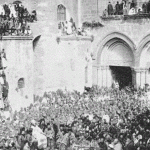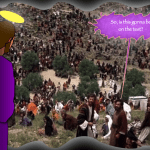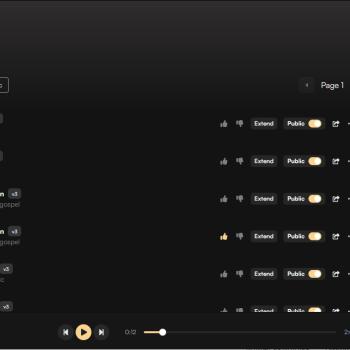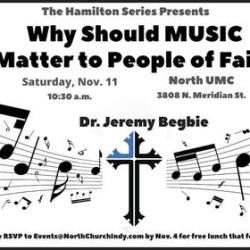The service yesterday, featuring rock music, went well, I thought. It was recorded, and so I thought I would share it for those who may be interested, in particular those who wished they could have been there but were unable to. My notes and an outline of the service follow below the videos.
Order of Service – Crooked Creek Baptist Church – April 24th, 2016
Announcements and Call to Worship
Hymn: “O Sacred Head Now Wounded”
Reflection 1: Preambles to the Psalms; Is all music sacred?; music and transcendence
Reason for choice of starting hymn: it is probably thought of as “sacred music” par excellence. It even has “sacred” right there in the title. And yet the melody, composed by Hans Leo Hassler and published in 1601, was first connected with a secular love song, the title of which was “Mein G’müt ist mir verwirret von einer Jungfrau zart.” For those who don’t know German, that means “A young girl has confused all my thoughts and feelings.”
The arrangement of the tune in our hymnals comes from none other than Johann Sebastian Bach. And that is worth highlighting, because Bach is the classic example of a Christian involved in music in a way that transcends any artificial divide between sacred and secular. All his music – whether instrumental, sacred, or a work like his cantata about coffee – are widely appreciated by people around the world, and not just within churches, because Bach didn’t focus exclusively on making “Christian music,” but focused on making great music, and as a result, his testimony as a Christian is a powerful one. Perhaps he was influenced by Martin Luther, who said that a Christian shoemaker’s testimony is not that they put Bible verses on their products, but that they make them of the highest quality.
We’ll return to the theme of Christians as light in the world of so-called “secular” music after our next song. But for now, I want to highlight that the setting of sacred words to tunes used for non-sacred purposes is at least as old as the Psalms. The musical instructions that precede a number of Psalms in the Bible mention tunes or perhaps styles of well-known songs, that were mentioned to indicate what the Psalms ought to sound like. The NIV makes this clear by explaining that phrases like “To Do Not Destroy” and “To Lillies” mean “To the tune of ‘Do Not Destroy’” and “To the tune of ‘Lillies’.”
I am not trying to make the case that no music is sacred. On the contrary, I am more inclined to make the opposite case and argue that all music is sacred. Music takes vibrations in the physical world and combines them in ways that we perceive as beautiful. And so music by definition points towards transcendence, towards the fact that there is more to life that what one perspective can do justice to. And since music is a pointer towards God, it makes sense to use music – any music – as an opportunity to talk about one’s faith and the things that are important to us.
Sacred music, inasmuch as the words are concerned, can be a strange thing. “O Sacred Head Now Wounded” has at least 11 verses. I hope you’ll forgive that we didn’t sing all of them, and that this next song is likewise based on only part of a Psalm…
U2, “40”
Reflection 2: Psalm 40:1-3 (Christians as Light in the [Music] World)
Bach is not the only Christian to have had an impact not only in churches but on the musical world as a whole. That last song is simply called “40,” and the lyrics are drawn from Psalm 40 (hence the name). The song is by an Irish band called U2, who have been more open about their Christian faith than a great many musicians. Because they simply make rock music, and not music that can be pigeonholed as Christian rock, some Christians have viewed the band unfavorably, and have even questioned their faith. But the involvement – in particular of the lead singer who goes by the nickname Bono – in visible ways in global action seeking social and economic justice, defending the poor and marginalized in ways that the Bible calls us to, are a powerful testimony. They are putting their money where their mouth is. One megachurch pastor described his experience of going to listen to Bono speak by saying, “I went in wondering if U2 were Christians, and I came out wondering if I was one.”
Throughout the history of Christianity, there have been individuals who took the lead in interacting with the culture in which they found themselves – interacting not just with the philosophers and thinkers but with the artists and other aspects of their society. They have always been criticized from both sides. Because being light in the world involves taking risks – being different both from those around you who prefer darkness, but also being different from those who prefer to keep the light huddled safely in a community of light, far away from where the darkness is. I thank God for the courage of musicians like Bach and Bono, and for the impact their testimony has had and continues to have.
Prayer
Reflection 3: Ecclesiastes 3:18-22 (Skepticism and Faith in Song)
I confess that in my teenage years, soon after coming to a personal faith, I didn’t know what to make of Ecclesiastes. “All is vanity”? “Eat drink and be merry”? “Don’t be too righteous”? Surely whoever included this in the Bible made a mistake, I thought. But such reactions reflect a superficial faith, one that thinks asking hard questions, and giving voice to doubt, is always an attack on faith, whereas sometimes it can be an expression of faith.
There is a song that actually uses the exact words found earlier in the chapter that the reading was from. We won’t be singing that song today, but if you express your disappointment to us after the service, we might include it sometime in the future. I am talking about the song “Turn, Turn, Turn” by the Byrds. It is a famous song, and the words of the title – “turn turn turn” – are the only words in the song that are not straight out of the Bible, out of Ecclesiastes chapter 3.
Ecclesiastes is an example of what is known as Wisdom literature. It approaches life and approaches God differently than other kinds of literature in the Bible. If you read a book like Deuteronomy, it makes its argument by appealing to what God is supposed to have revealed to Moses on Mt. Sinai. If you read Isaiah or Jeremiah you get words prefaced by “thus says the LORD.” But how do you communicate with those who don’t accept your authority as a prophet, or the authority of a text that is supposed to record a covenant between God and a particular nation? The only way to do it is to start with things that you share in common, to talk about the observable world and human experience, and to make that the basis of your conversation.
Wisdom literature often resonates with seekers, with those who don’t simply accept things on authority for the very reason that they know that there can be false as well as true prophets, and so the seeker after truth must test everything. And sometimes the recognition that we are but dust, that the things of this world are transitory, leads people to engage in a spiritual quest.
One such seeker is a man by the name of Kerry Livgren, who tried out a number of different religious traditions before converting to Christianity. Livgren expressed some interesting thoughts about music in his autobiography Seeds of Change. He wrote:
Though we as Christians have a mandate to be skillful and creative, and Scripture affirms that we should sing unto the Lord a new song, we rarely hear anything truly new. The atmosphere of Christian radio is so limited as to be almost stifling. Not only is it as highly formatted as its secular counterpart, but in most cases, the artist must conform to some sort of spiritual criteria–someone’s definition of what makes his or her music acceptable Christian music. It’s a strange irony indeed that finds lyrics with the most profound truth coupled with the most unchallenging sort of muzak.
The name “Kerry Livgren” may not be familiar to some of you. But the band of which he was a founding member and dominant songwriter – the band Kansas – should be familiar to most of you. Here is a famous song from his phase as a seeker, one that resonates with a theme found in Ecclesiastes and in the psalms. It’s called “Dust in the Wind.”
Kansas, “Dust in the Wind”
Offertory Prayer
Offertory Music: “Be Still My Soul” (Finlandia)
Reflection 4: Acts 17:24-28 (As Your Own Poets Have Said)
The offertory music was not a break from the theme of what might be called “secular” music in today’s service. The melody is known to some of us as “We Rest on Thee, Our Shield and Our Defender.” In the hymnal this church uses, the words are different, and the title is “Be Still My Soul.” The composer of the melody is Finnish composer Jean Sibelius, and it comes from a nationalistic work called “Finlandia.”
Most Christians are OK with secular music, and might agree with me that no music is inherently secular. But what about words that are secular? There, we actually have just as clear evidence, if not indeed clearer evidence, than we do for the use of already-existing melodies in the Psalms. In Acts 17, Paul explicitly quotes from Greek poets. What you might not realize, though, unless you actually find the works Paul is quoting from and read more of them, is that he was quoting what Greek poets had said about Zeus. Paul knew that he could not simply quote the Jewish scriptures at people for whom those Scriptures hold no authority. Paul recognized that there was truth in poems that would be familiar to his audience, and he used that poetry as a bridge, as a starting point for sharing his own faith with them.
This brings us, in a sense, to the heart of the message that is the overarching theme of today’s service. Songs like the ones we are singing today can be a bridge for communicating our faith with others. But in order to be able to do that, we need to be ready to recognize that, just as we are not always right as Christians, others are not always wrong. In our frail humanity, as we seek to give voice to our views and values, and others do the same, we can find that we have points of contact which can be starting points for conversations.
What about lyrics where you cannot tell if they are secular or religious, Christian or pagan? Christian music sometimes receives complaints that the words are not clearly distinguishable from those of “worldly” love songs, treating God as a divine boyfriend. But the same can be said of songs from outside the church. The first song I ever sang as a solo in this church was “You Raise Me Up” and it can be understood as a prayer, or as a love song. That was intentional. And the same is true of this next song, which is also one that we included in a service once before. The song is by Peter Gabriel, and was written so that it could be a prayer or a love song. We offer it today as a prayer. But we also offer it today as an example of the way you can turn on the radio and find something to talk about with others with whom you might share your faith, if only you knew how to start the conversation. Here is a starting point for a conversation: “In Your Eyes.”
Peter Gabriel, “In Your Eyes”
Reflection 5: Psalm 22:1-2 (The Lost Tradition of Lamentation)
Sometimes the church has something precious that it has preserved which those outside desperately need. But sometimes we as the church have forgotten something. And sometimes by interacting with others, we are reminded of things that we have been neglecting.
Now, to be fair, I am not depicting Dennis De Young (who wrote the next song we’re going to sing) as an example of someone “outside the church.” He is a devout Catholic (and for fans of Broadway musicals, you may know him for his performance as Judas in Jesus Christ Superstar). But the song itself is one that was released on a secular album and is heard on secular radio. And yet the song is in essence a lament. It is a heartfelt cry to God from someone who recognizes that, as the people that we look up to fail, it can shake our faith.
You can look through our hymnal carefully, and you will not find much in the way of laments, and certainly nothing like the proportion that one finds in the Book of Psalms in the Bible. The lament is not simply something for the “Old Testament.” Jesus himself is depicted in the Gospels of Mark and Matthew as reciting Psalm 22 on the cross. If we pretend that we do not face doubts and uncertainties, and thus have no need of laments, we’re not only not being honest with ourselves and with God. We are claiming to have no need of something that, according to the New Testament, Jesus himself needed. And so I hope you enjoy this song, by the band Styx, which is a prayer asking God to “show me the way.”
Styx, “Show Me The Way”
The last song this morning brings us back to where we started, albeit in a more recent version. We started with sacred words to a secular tune. Some words to hymns were written with no particular tune in mind. A famous example is “Amazing Grace.” It appeared without a tune, and was first printed alongside a tune that is never heard today, “Hephzibah.” It eventually came to be connected with an American folk tune (often called “New Britain”). It fit so well that that tune today is simply thought of as “Amazing Grace.” If there is a lesson in all this, it is that our faith is not something fragile that we need to keep isolated from the dangers of other music lest it become tainted. The powerful words that John Newton composed were not made less powerful or sacred when they came to be associated with that folk melody. On the contrary, the melody was made sacred. That doesn’t always happen. And I am quite sure it will not happen with the music that will accompany Amazing Grace today. But Amazing Grace is in what is known as common meter, and it fits a lot of different tunes. Here it is to the tune of “House of the Rising Sun.”
When the words are done, I will go to the back of the church to greet those who leave. But the band will not stop playing right away, because we have been having so much fun offering these songs here this morning. Music is but one of the things that people in this church are passionate about. Find what you are passionate about, and figure out how it connects to your faith, and see what happens as you talk about your passion with others.
“Amazing Grace” (to the tune of “House of the Rising Sun”)
Go in peace, with a new song in your hearts, to love and serve God.













